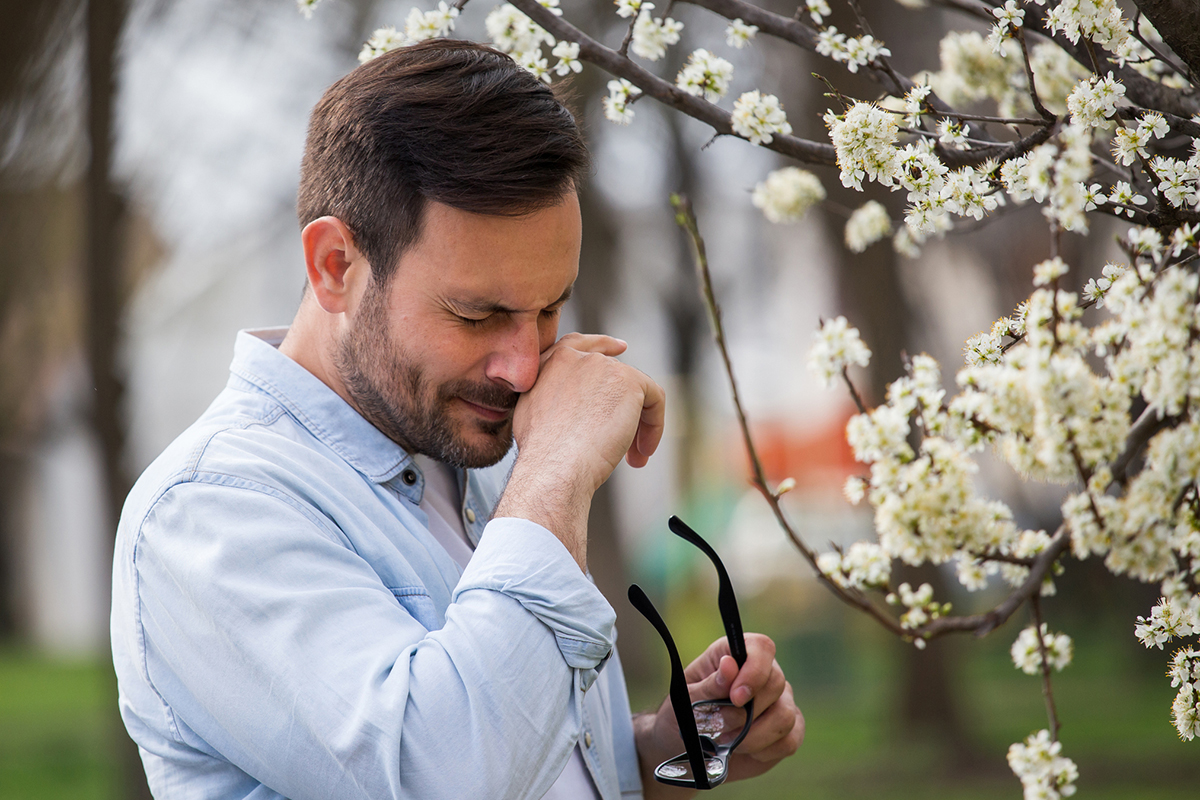“April is the cruelest month . . .” T. S. Eliot, The Wasteland
After a winter of hard exertions, with active vacations and regular workouts at home, my body hit the skids. It happens to me sometimes as the seasons change. As spring progresses, it’s warm some days, beckoning me to run or cycle outside; the added hours of sunlight are energizing, and I hit the weight room or the pool with renewed zeal. The workouts seemingly took their toll—on a recent day I woke up tired, achy and uncharacteristically unmotivated. After all, I tried to reassure myself: “Act your age!” Frustrating as it may seem, a little break for recovery is an essential component of any training regimen—isn’t it?
But why now? It also occurred to me that this is the very time when the trees and flowers are exuberantly blooming, spreading pollen that coats recently car-washed surfaces with a light green powdery film. Could spring allergies have something to do with my power failure?
In fact, research supports the notion that seasonal allergies can do more than cause runny noses, sneezing, wheezing and itchy eyes. Allergy websites feature headlines like:
- Can Allergies Cause Body Aches and Fatigue?—Center for Allergy and Asthma of Georgia
- Do Allergies Cause Body Aches?—Charleston ENT and Allergy
- The Return of Seasonal Aches, Pains and Allergies—Pacific Surgical Center
- Allergies Are an Often-Overlooked Cause of Fatigue, Body Aches, and Pain—A.A.I.M. Group
So this really is a thing!
It’s thought that allergies prompt inflammation, not just in the respiratory tract where the immune system directly encounters foreign antigens in the form of pollen, but also throughout the body. Histamine is a chemical messenger that can enhance sensitivity to pain and local swelling. It’s even thought to be one of the key mediators of DOMS—delayed onset muscle pain, that kicks in 24-48 hours after a hard workout.
An intriguing study examined the relationship between pollen allergies and tendon quality in mice:
“To determine whether the systemic inflammation accompanying these conditions contributes to the onset of tendinopathy, we studied the effect of a systemic inflammation induced by an allergic episode on tendon properties. To this end, we induced an allergic response in mice by exposing them to a timothy grass pollen allergen and subsequently analysed both their flexor and Achilles tendons.”
After the mice received a pollen challenge, the researchers noted a significant decline in the flexibility and strength of their tendons. Their blood showed distinct signs of inflammation.
In the same study, a survey of human allergy sufferers confirmed an association between seasonal allergies and worsening symptoms of shoulder pain, characteristically caused by tendon injury.
The authors conclude:
“Overall, our study demonstrates that the presence of an allergy-induced elevation of circulating inflammatory cytokines and chemokines over a relatively short period of time is sufficient to have a detrimental effect on tendon quality and function . . . Importantly, data analysis from a large health survey study indicated that patients suffering from an allergic condition have a moderately increased risk to develop a tendinopathy.”
A case study entitled “Seasonal Allergy Induced Back Pain: A Report of Two Cases” further supports the allergy-pain link. The authors reference a 1999 paper by epidemiologists Hurwitz and Morgenstern who interviewed a large population between 20 and 39 years of age and found that “patients with a history of allergy were 50% more likely to report suffering from back pain and depression.”
They argue that the back is a sentinel for body-wide inflammation: “The allergic cascade produces inflammatory, pain-producing cytokines and neuropeptides which may exacerbate other chronic conditions.”
Headaches and migraines, too, are susceptible to triggering by seasonal allergies, as are other pain conditions. The Journal of Urology even featured a study that showed a concordance between pollen exposure and chronic pelvic pain flares.
It would stand to reason, then, that fibromyalgia intensity might be influenced by allergies. Indeed, sufferers of this body-wide pain syndrome are more likely to experience seasonal allergic rhinitis, according to a study. While the causes of fibromyalgia remain elusive, there’s strong evidence that mast cells—tiny factories for the release of histamine and other inflammation-signaling molecules—are among the leading causes of neuroinflammation that underlies fibromyalgia.
It’s hard to maintain a cheery mood when you’re achy. But there’s evidence that not only are allergy-related symptoms a bring-down, but that seasonal pollens can directly impact the brain. Pulmonary Advisor warns clinicians that “Seasonal Allergies [Are] Often Accompanied by Mental Health and Sleep Disorders”:
“A growing body of research indicates a significant connection between allergies and mental health, especially among women . . . For at least 75 years, doctors have identified and written about the association between depression and anxiety and allergic rhinitis . . .Many patients suffering with allergies who are also experiencing mood disorders may not be aware that the 2 problems could be connected.”
One study—albeit speculative—even proposes a role for allergy in accelerating progression to Alzheimer’s disease:
“Allergy was also found to increase phosphorylation of tau protein in the brain. The present data support the notion that allergy-dependent chronic peripheral inflammation modifies the brain inflammatory status, and influences phosphorylation of an AD-related protein, indicating that allergy may be yet another factor to be considered for the development and/or progression of neurodegenerative diseases such as AD.”
With the advent of spring there’s also the stress of adaptation to changes in temperature. Those of us who live in temperate climates like the Northeast undergo winterization for the cold months, and then are whipsawed into acclimating to sweltering temps when spring morphs all-too-rapidly into summer.
It doesn’t help that in springtime there are wild fluctuations in temperature and cloud cover that jolt our bodies. Even sunlight transitions that accelerate in spring and fall challenge our circadian rhythms. The switch to daylight saving time has been shown to worsen that stress, like jet lag.
And, of course, there’s barometric pressure. As evidenced by the prevalence of wild tornadoes in springtime, it’s a season of dramatic shifts in atmospheric pressure. Even if you’ve not yet experienced it, surely you’ve heard from an elderly relative that they could reliably predict the approach of a storm by flare ups in their joint pain. WebMD reports:
“Changes in barometric pressure may make your tendons, muscles, and any scar tissue expand and contract, and that can create pain in joints affected by arthritis. Low temperatures can also make the fluid inside joints thicker, so they feel stiffer.”
If all else fails, blame climate change.
There’s evidence that seasonal allergies are getting worse. A National Wildlife Federation report predicts that increasing global temperatures and CO2 concentrations—which make plants thrive—will produce longer and more intense allergy seasons. Compounding the problem, in efforts to “green” urban environments, cities have been planting the wrong types of trees. NBC Washington reports:
“ . . . city planners and urban landscapers prefer to plant male trees over female trees because they’re easier to maintain. The problem is, that may be making your allergies worse.”
Horticulturalist and author Tom Ogren decries what he terms “botanical sexism”:
“The males produce millions of flowers, and each flower has hundreds of anthers that produce tons of pollen. The female trees produce seeds. They produce no pollen.”
Is the transition to springtime a speed bump for you? Share your impressions with us via questions@drhoffman.net and we may share your responses in an upcoming edition of Q&A with Leyla.
For tips on heading off spring allergies, check out my article “10 tips for surviving allergy season”.








